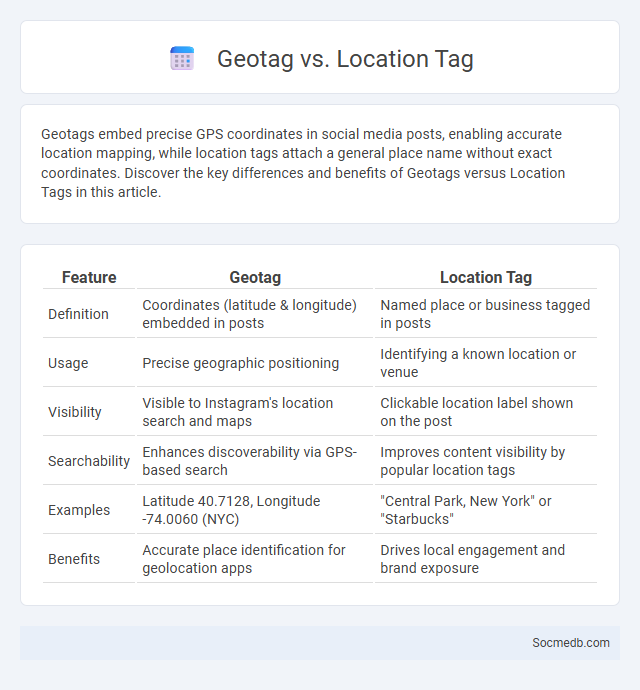
Photo illustration: Geotag vs Location Tag
Geotags embed precise GPS coordinates in social media posts, enabling accurate location mapping, while location tags attach a general place name without exact coordinates. Discover the key differences and benefits of Geotags versus Location Tags in this article.
Table of Comparison
| Feature | Geotag | Location Tag |
|---|---|---|
| Definition | Coordinates (latitude & longitude) embedded in posts | Named place or business tagged in posts |
| Usage | Precise geographic positioning | Identifying a known location or venue |
| Visibility | Visible to Instagram's location search and maps | Clickable location label shown on the post |
| Searchability | Enhances discoverability via GPS-based search | Improves content visibility by popular location tags |
| Examples | Latitude 40.7128, Longitude -74.0060 (NYC) | "Central Park, New York" or "Starbucks" |
| Benefits | Accurate place identification for geolocation apps | Drives local engagement and brand exposure |
Understanding Geotag: Definition and Purpose
Geotag refers to the digital identification of a specific geographic location attached to your social media posts, photos, or videos. It uses GPS coordinates or place names to provide context and relevance, enhancing content discoverability and user engagement. Understanding geotags enables you to connect with local communities, track location-based trends, and boost the visibility of your social media presence.
What is a Location Tag?
A location tag on social media is a geotag that identifies the specific place where a photo, video, or post was created or is relevant to. It enhances your content's visibility by allowing users searching for posts from or about that place to discover your updates easily. Using location tags can increase engagement by connecting your content to local events, businesses, and communities.
Key Differences: Geotag vs Location Tag
Geotags embed precise GPS coordinates into your social media posts, enabling platforms to pinpoint the exact spot where your content was created, enhancing location-based search and discovery. Location tags, on the other hand, provide a broader, user-friendly place name such as a city, landmark, or business name without the exact coordinates. Understanding the key differences between geotags and location tags helps you optimize your content for better local engagement and visibility on social platforms.
How Geotags Work in Digital Media
Geotags are metadata embedded within digital media that indicate the precise geographic location where a photo or video was captured, utilizing GPS coordinates or IP address data. These tags enable platforms to organize and display content based on location, improving the relevance and discoverability of posts in social media feeds and location-based searches. By understanding how geotags work, you can strategically use location data to enhance your social media engagement and target audience reach.
The Functionality of Location Tags on Social Platforms
Location tags on social media platforms enhance user engagement by allowing posts to be associated with specific geographic coordinates, increasing discoverability through localized searches and trending places. These tags enable businesses and influencers to target audiences more effectively by leveraging local content strategies and driving foot traffic or online interactions tied to particular regions. Integration of location tagging also supports data analytics and demographic insights, enabling platforms to personalize content feeds and advertising campaigns based on user location patterns.
Benefits of Using Geotags
Geotags enhance your social media posts by providing precise location data, increasing engagement through local relevance and discoverability. They enable businesses to attract nearby customers and boost brand visibility by connecting content with specific places. Using geotags strategically improves audience targeting and drives higher interaction rates on platforms like Instagram, Facebook, and Twitter.
Advantages of Adding Location Tags
Adding location tags on social media enhances the discoverability of your posts, attracting a local audience and increasing engagement rates. Location tags help businesses and influencers target specific geographic regions, boosting relevance and driving foot traffic or local sales. Your content gains credibility as location tagging provides context, making it easier for followers to connect with the experiences you share.
Geotag vs Location Tag: Which to Use?
Geotags provide precise latitude and longitude coordinates that enhance content discoverability through location-based searches, while location tags offer broader, recognizable place names that connect your posts with specific venues or cities. You should choose geotags when targeting an audience seeking exact geographic details, and location tags to engage users interested in popular or well-known areas. Optimizing your social media strategy with the appropriate tag type can significantly boost engagement and reach.
Privacy Concerns with Geotags and Location Tags
Geotags and location tags on social media platforms can expose users to significant privacy risks by revealing their real-time whereabouts and habitual patterns. Malicious actors may exploit this data for stalking, burglary, or identity theft, compromising individuals' personal safety and security. Users should carefully manage location-sharing settings and regularly audit tagged content to mitigate potential privacy breaches.
Best Practices for Geotagging and Location Tagging
Geotagging and location tagging on social media enhance content visibility and engagement by connecting posts to specific places, making it easier for users to discover your content in local searches and location-based feeds. Use precise, relevant locations and popular tags to increase reach, while avoiding overly broad or unrelated tags that can dilute your content's effectiveness. Ensure your privacy settings are carefully managed to control who can see location information, protecting your personal data while maximizing the benefits of geotagging.
 socmedb.com
socmedb.com